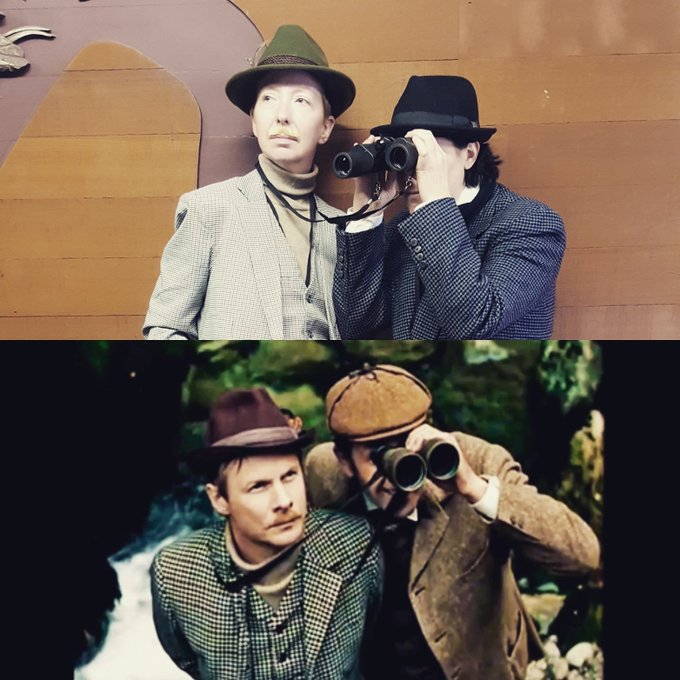I’m going to tell you a secret: there’s no such thing as the “best” Sherlock Holmes when it comes to screen portrayals. There’s no ranking, either by quality, canonicity (whatever that is), or hotness, that is based on anything but the ranker’s own conscious and unconscious biases. Indeed, the fact we’ve got hundreds to choose from at this point is proof of this concept--no one will ever embody the platonic Holmesian ideal… because that ideal is different for every viewer, and every era.
Like many long-lived characters, Holmes has gone through phases in how he’s presented. And, like Jesus, or Dracula, or Batman, these phases are not random. Every version is a response to something: to the text, sure, but also to history and culture and current events and what the last ten people did with Sherlock Holmes. So the question of “who wore it best” is irrelevant. The real interesting question, to me, is why each Holmes is needed in their time, and what they bring to our understanding of Sherlock Holmes and ourselves.
It’s been observed many times that there’s something timeless and magical about the great detective, in the sense that he embodies qualities that 1) are always going to be of interest and value to us and 2) is a malleable enough figure that he can be fit into a lot of different molds without becoming unrecognizable. A hero who, without any superpowers or inhuman abilities, relies on fact and logic alone to solve the world’s mysteries is a powerful hero indeed. At almost any point in human history, it’s reassuring to think that things make sense, that someone smart enough could explain that which we can’t. He also provides a fascinating set of dichotomies, existing on several knife-edges of society and culture, which makes him useful when exploring class, the urban/rural divide, emotion vs thinking, substance abuse, mental health and neurotypicality, law and order vs crime, and anti-sociability within one of the greatest bromances of all time. Holmes can take on a multitude of human attributes, depending on what you choose to focus on, and that he originally existed in a serialized, nonlinear format means no one is terribly fussed about continuity when creating new adventures--except, of course, for those whose entire Sherlockian careers has been given over to fussing over minutiae of continuity.
By cohesively and consistently embodying contradictory elements, then, Sherlock Holmes has, for over 100 years, been a persistent figure in popular culture. And the image that comes to mind when you read those words may be different from the next person to read this, and you may both believe that you are correct in your assessment that yours is the “right” Holmes.
You’re both correct.
I’m going to outline a brief history of Holmes which is biased towards my own “unifying theory” of Holmes representation. There is not enough space here to mention every version, nor am I unaware that there will be items that do not fit this thesis. Culture, and its production, are not logical nor linear. I can merely detect patterns, amplified by various cultural moods and needs, but there will always be that writer or filmmaker who has a wild notion they get to play out. Nor do the following rough categories encapsulate every aspect of any one version, or represent any qualitative judgement. My entire point is that there really isn’t any “bad” Sherlock Holmes, because each iteration was what was considered necessary at that time and under that specific set of circumstances. You might not like them--and I myself dislike plenty. But they all have a reason to exist no matter how far off the mark they might feel to you--or to later audiences.
The first set of representations are exactly that: an attempt to put the canon on screen. The most notable of these is the series of 47 silent films starring Eille Norwood. Today those I’ve had access to look stodgy and still even by silent film standards, but at the time they were praised for their faithfulness, by no less than Arthur Conan Doyle himself. We also have, thanks to diligent film seekers and restorers, a film version of the celebrated William Gillette play, which while not really based on a single story does portray Holmes as a very heroic, stoic, upright figure. There is an attempt, however you might judge the interpretation, to recreate the feeling of the stories on film, with a scrupulous honor given the material.
Of course no time in human history is without its attempts at satire and humor, so there are several amusing takes on Holmes not meant to be taken seriously. Famously, the first known portrayal of Holmes on film is 1901’s Sherlock Holmes Baffled, which is simply a camera trick played too long, but my favorite is 1914’s The Leaping Fish which features Douglas Fairbanks as Coke Enneday. (Say the name out loud and you’ll get the gist of the film.)
Some attempts at Holmes were made in the 30s, mostly very static in the way of much early sound film, but the big push that more or less reintroduced Holmes to the US public were the Basil Rathbone and Nigel Bruce films of Fox and Universal in the late 30s/early 40s. Given their quality and the fact there were 14 of them, these films maintain a lasting impact on the cultural perception of Sherlock Holmes--and of Dr. Watson as a bit bumbling and stupid. But beyond that, these films served a useful cultural purpose. Rathbone’s upstanding, patrician, and beautifully heroic Holmes offered up a British hero we could not only put our faith in but see as a worthy ally, and it’s no accident that most of these films are updated to a current timeline where Holmes can take on modern problems. (Like Nazis.) This is not simply an attempt to make Holmes “relevant,” but to invite American audiences into the war effort, as Hollywood cranked up a wartime propaganda machine not limited to overtly racist newsreels about the threat from Germany and Japan.
While Holmes was assayed a few times in the 50s, (most notably for me in the television series starring Ronald Howard and H. Marion Crawford,) there was a largely dormant period as the UK and US got back to business as usual. This all changed after the cultural and political upheavals of the 1960s, giving rise to a series of films which questioned the very nature of Sherlock Holmes in various ways. The Private Life of Sherlock Holmes (1970), They Might Be Giants (1971), and The Seven-Per-Cent Solution (1976) were all in some sense deconstructions of the myth. I do not think they are a diminishment of the heroic nature of the character, but they all do call into question what we know about him, either by prying into his personal affairs, his psychology, or by displacing his nature onto the potentially mentally unbalanced mind of a modern-day man who merely thinks he’s Sherlock Holmes. All of this reflects the unbalanced social scene of the 1970s, as long-held cultural beliefs were challenged and people sought new modes of understanding--or coping.
With the return to at least superficial socioeconomic steadiness represented by the 80s, we see some of the most prestigiously ‘faithful’ adaptations yet. Both the Soviet series starring Vasily Livanov and the British Granada series starring Jeremy Brett were beholden to the original stories in a way few had attempted in decades. Well-funded, well acted, and generally very serious works, these series served to introduce the characters of Holmes and Watson to new generations on multiple continents, with a love for the source material that, in a sense, speaks to a desire to “get back to” something lost to time. There is a nostalgia in these series, in some sense for a time that never was, that does not question the cultural assumptions contained therein. This reflects the way the 1980s represented, for many, a yearning for stability and safety. This isn’t to say that there were no risks taken in terms of production, but the thrust of these shows away from deconstruction and towards accuracy (whatever that means) implies a search for stability. And both of these versions were very popular. The 80s also saw “safe” entries into the humor and children’s movie categories with Without a Clue and Young Sherlock Holmes, both of which seemingly diverted far from canon but in relatively unthreatening and/or joking directions accessible to a wide movie-going audience.
Given their solid “completeness,” it makes sense that these icons stood for some time as the platonic ideal of Sherlock Holmes, untouched until one of the biggest proliferations of Holmes material began in 2009 with Guy Ritchie’s action movie Sherlock Holmes, starring Robert Downey, Jr, and continued with the fandom-revitalizing modern day BBC version with Benedict Cumberbatch and CBS’s Elementary starring Jonny Lee Miller. We even had a prestige entry with Ian McKellan’s 2015 film, Mr. Holmes. On the surface, these might have little in common apart from, in the first three, a very modern sensibility. But I would argue that all four of these titles explore Holmes’ presence on the neurology spectrum. Without (in most cases) overtly diagnosing Holmes with, say, having autism or otherwise being on the spectrum of neuroatypicality, all of these Holmes present a form of wrestling with their place in the larger world of “normal” people. With drug addiction, learning disorders, and emotional health far more acceptable topics of public discourse, it makes sense, and fans have long speculated about Holmes’ behavior in regards to their own diagnoses. What makes these Holmes portrayals different is that all are presented as both heroic and worthy of our regard and also having overt difficulty functioning with everyday life. One never got the sense that Basil Rathbone had bad days, and even Jeremy Brett’s sometimes jerky and eccentric Holmes (powered in part by his own undiagnosed emotional issues) went unremarked upon in the context of mental health. But for these more recent Holmes’, their brilliance cannot be separated from their struggle with chemical dependency, difficulty relating to others, or inability to relate to the world as others do. With Mr. Holmes, while his mental deterioration is not because of his special gifts, it does present unique issues given his habitual brilliance. These Sherlocks present a narrative about living in the world with a brain that is differently suited to its tasks and foibles. And this, I think, is largely because we live in a world where it is far more acceptable to discuss such things as difference, not disorder.
Recent Sherlock Holmes offerings have yet to offer up a pattern to my mind, but I will say that we are seeing a recent spate of reimaginings which focus on diversity to varying degrees. Millie Bobbie Brown plays Sherlock’s sister in Enola Holmes. Miss Sherlock offers a modern-day Japanese Holmes and Watson--who are both women. The Irregulars has a diverse cast of younger investigators and a Watson who is mixed-race--and not straight. This could imply a cultural interest in race, ethnicity, and sexual/gender identity which I think is a welcome discussion and which Holmes is perfectly capable of enfolding within his narrative umbrella.
Whatever comes next, what I think the past 120 years has shown is that Sherlock Holmes can take it. He--or she, or they--can be used to fight Nazis, to address concerns about mental health, to explore issues of race and class, or any number of things I’m sure I haven’t thought of yet. The point is that he will always stand for truth, and truth is something we, as a society, are always seeking. We will probably never have final answers for any of the larger questions we ask, and thus, Holmes will always be needed to stand for those questions as he asks them himself.



